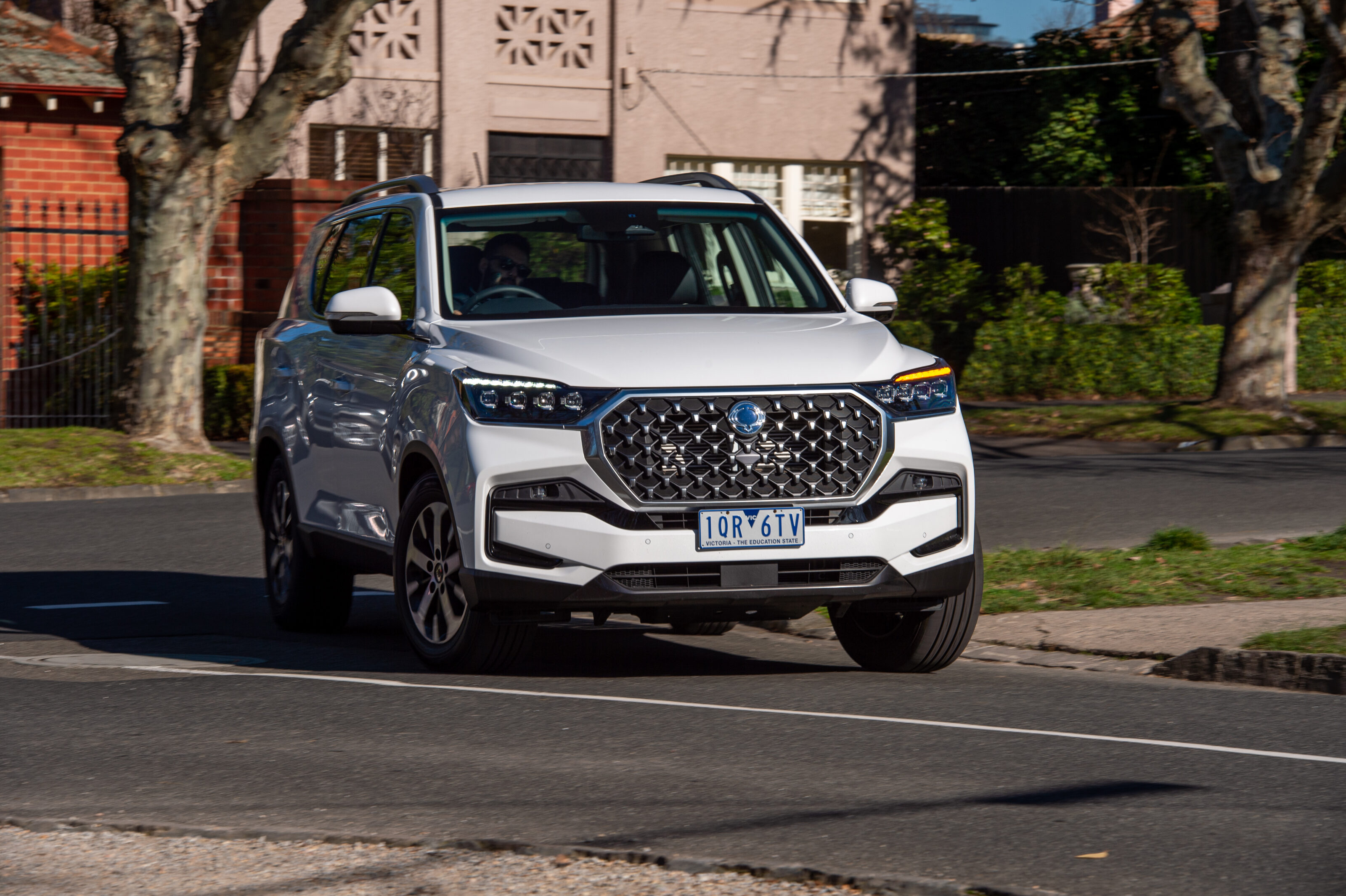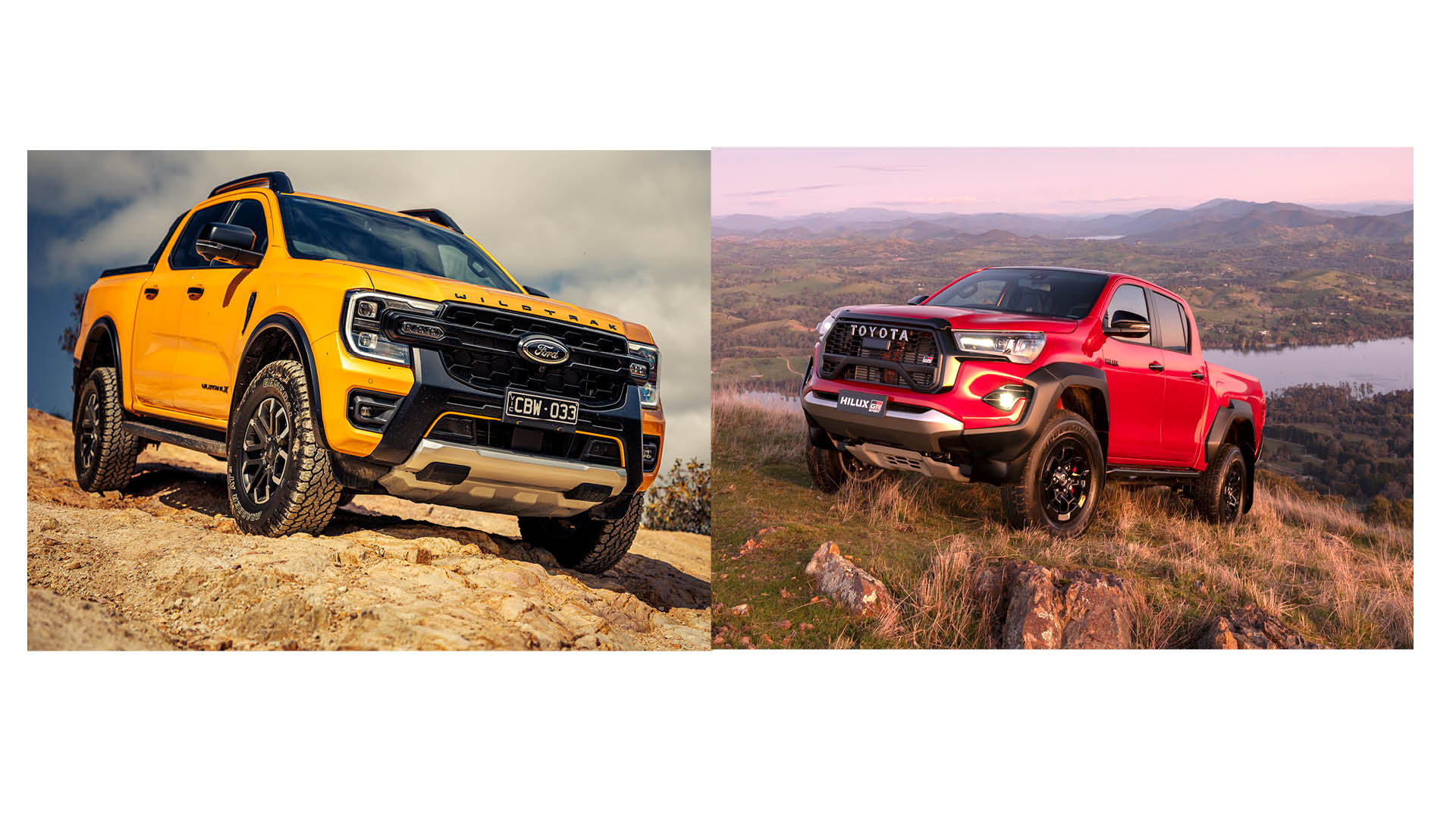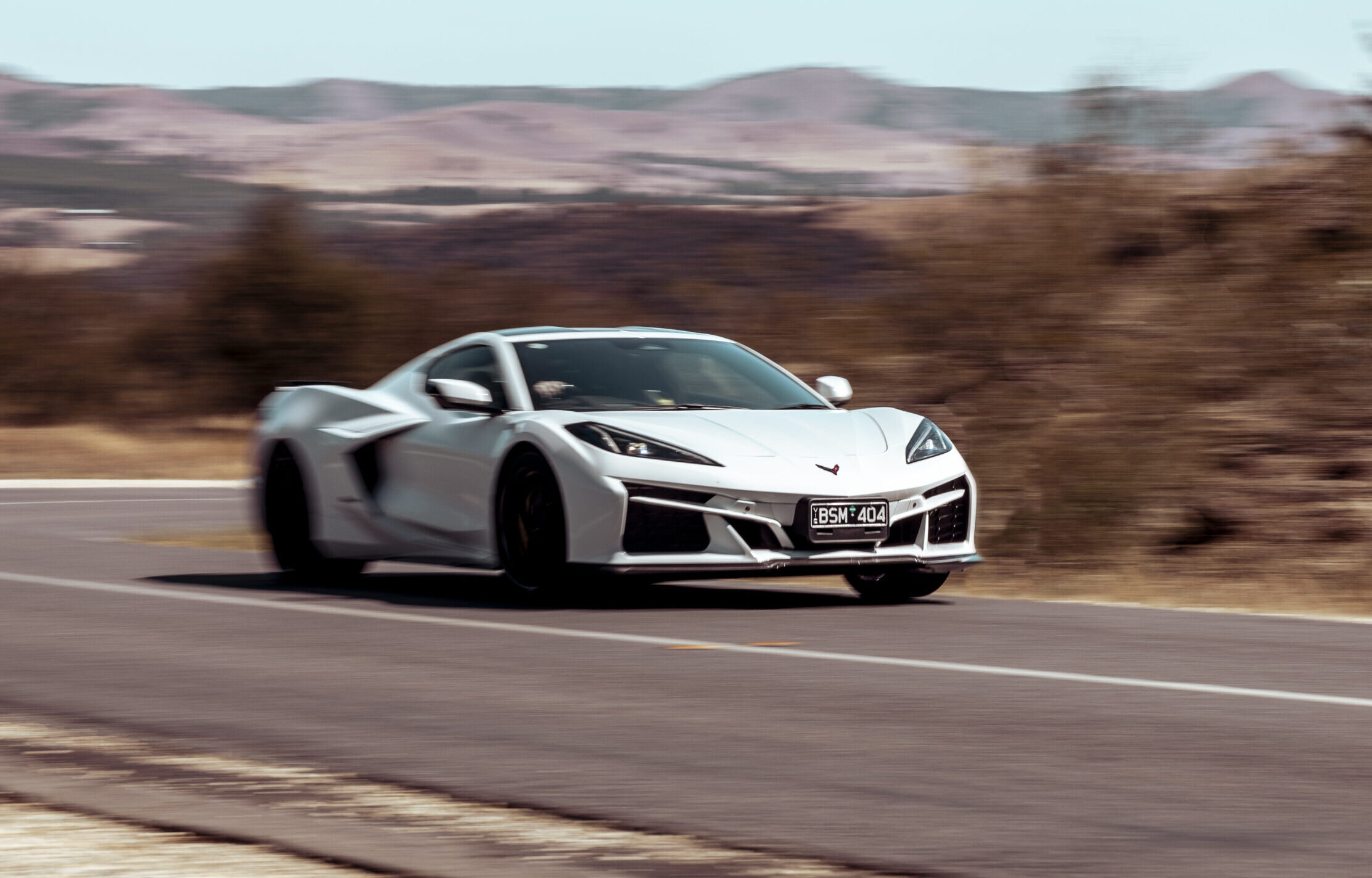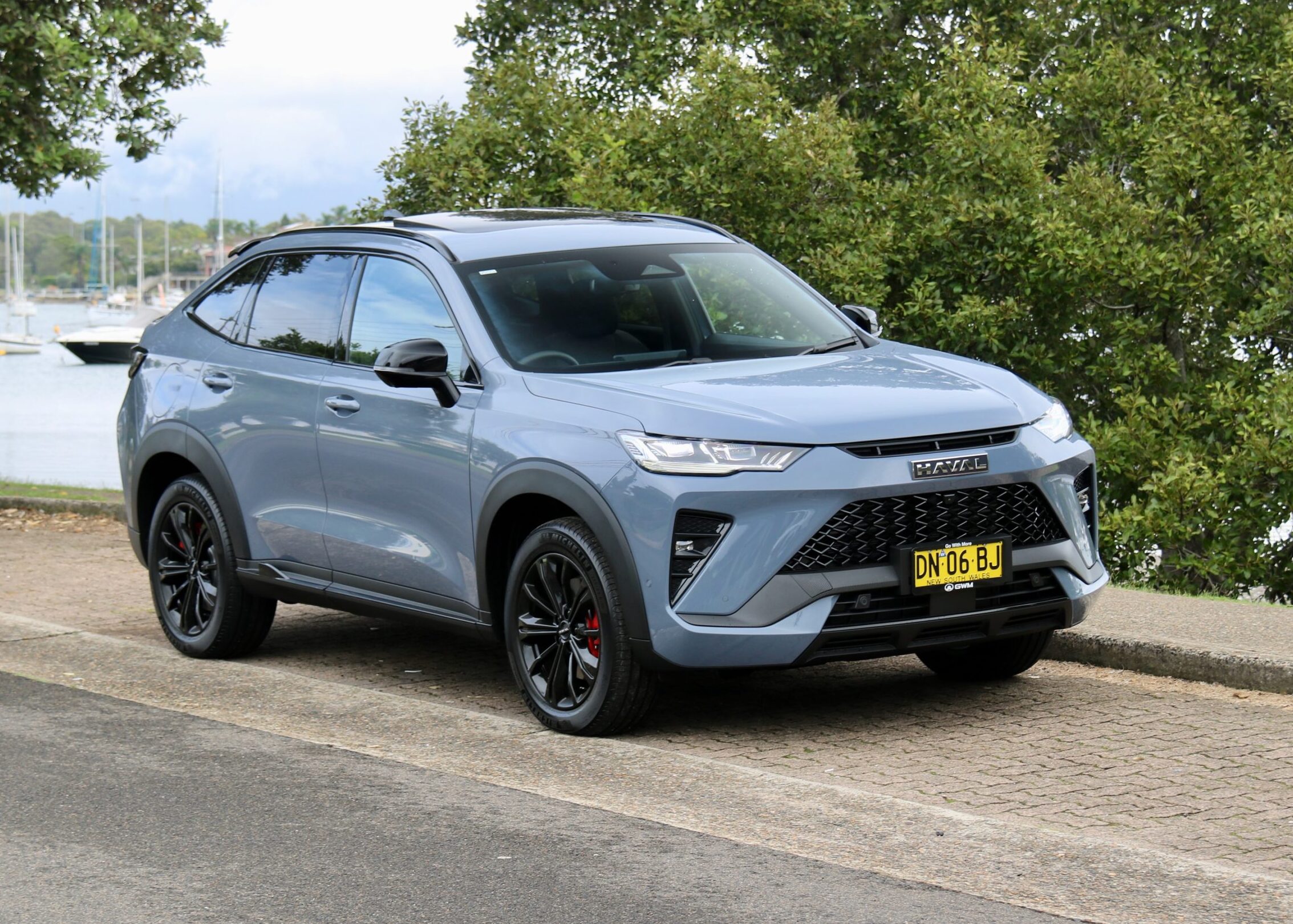Score breakdown
Things we like
- Price and equipment levels
- Performance
- Cabin comfort and quiet ride
Not so much
- Ride and handling
- Claustrophobic third row
- No adaptive cruise control
The ELX is the more affordable of the two-pronged SsangYong Rexton range, which on paper at least offers a pretty good bargain for anyone seeking a features-packed, ute-based four-wheel-drive SUV.
While this is the entry-level variant in the Australian line-up, its sharp, fixed drive-away price brings similar equipment levels to pricier medium-spec seven-seat rivals, such as the Mitsubishi Pajero Sport GLS, Isuzu MU-X LS-U, and Ford Everest Trend.
And while it misses out on a bunch of features found in the range-topping Rexton Ultimate, there are reasons to choose this beyond its cheaper price tag.
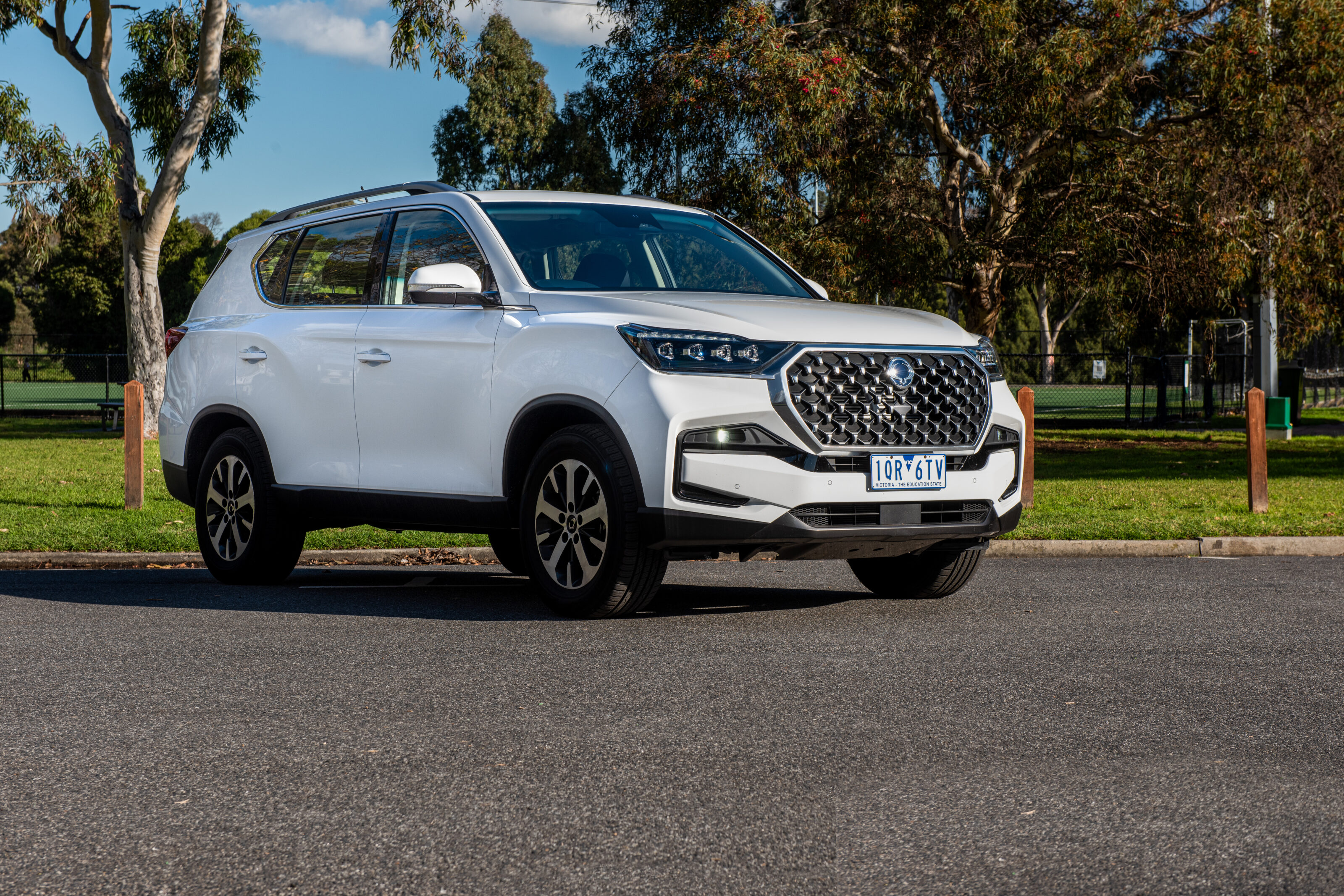
Pricing and Ownership
This is the second-generation model of the Rexton seven-seat SUV, which shares underpinnings with the SsangYong Musso 4×4 ute. It underwent a significant facelift in 2021 that brought a much bolder-looking front end dominated by the huge grille and attractive quad-style LED headlights, LED daytime running lights and LED foglights.
The ELX is priced at a very competitive $48,990 drive-away, with the range-topping Rexton Ultimate coming in at $55,990 drive-away.
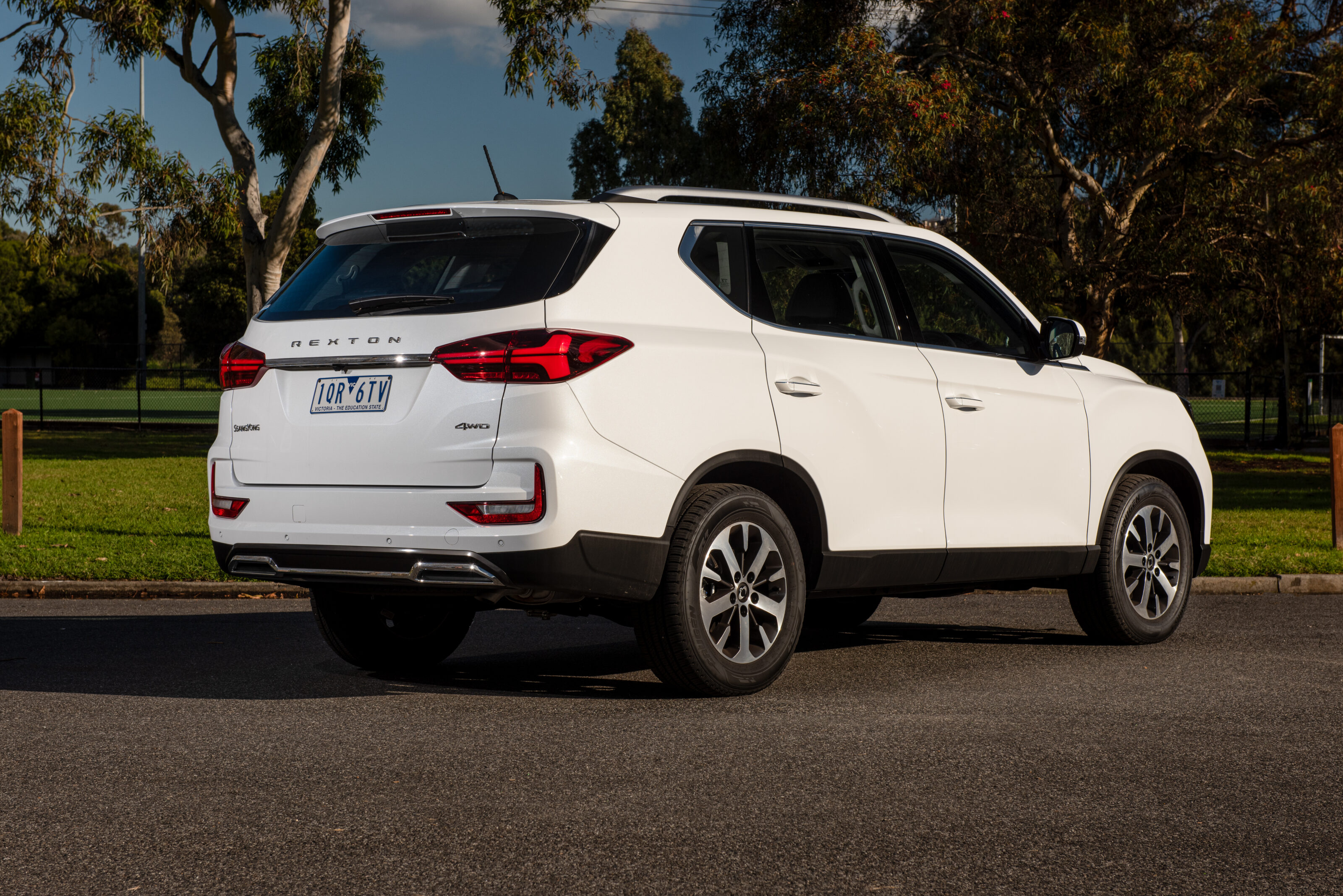
Both are powered by a 2.2-litre turbo-diesel engine with an official combined fuel economy rating of 8.7L/100km, which isn’t bad for a 2.3-tonne wagon.
Running costs are also kept down with an affordable service regime under the brand’s 777 Care Cover that includes a seven-year warranty, seven-year roadside assistance plan, and seven years of capped-price servicing.
Like all SsangYong models, it has a 15,000km/12-month service schedule, which costs $375 for each service and includes oil changes plus air- and oil-filter replacements. As with most brands, you pay extra for parts when required, for which SsangYong provides up-front pricing for different parts.
Features
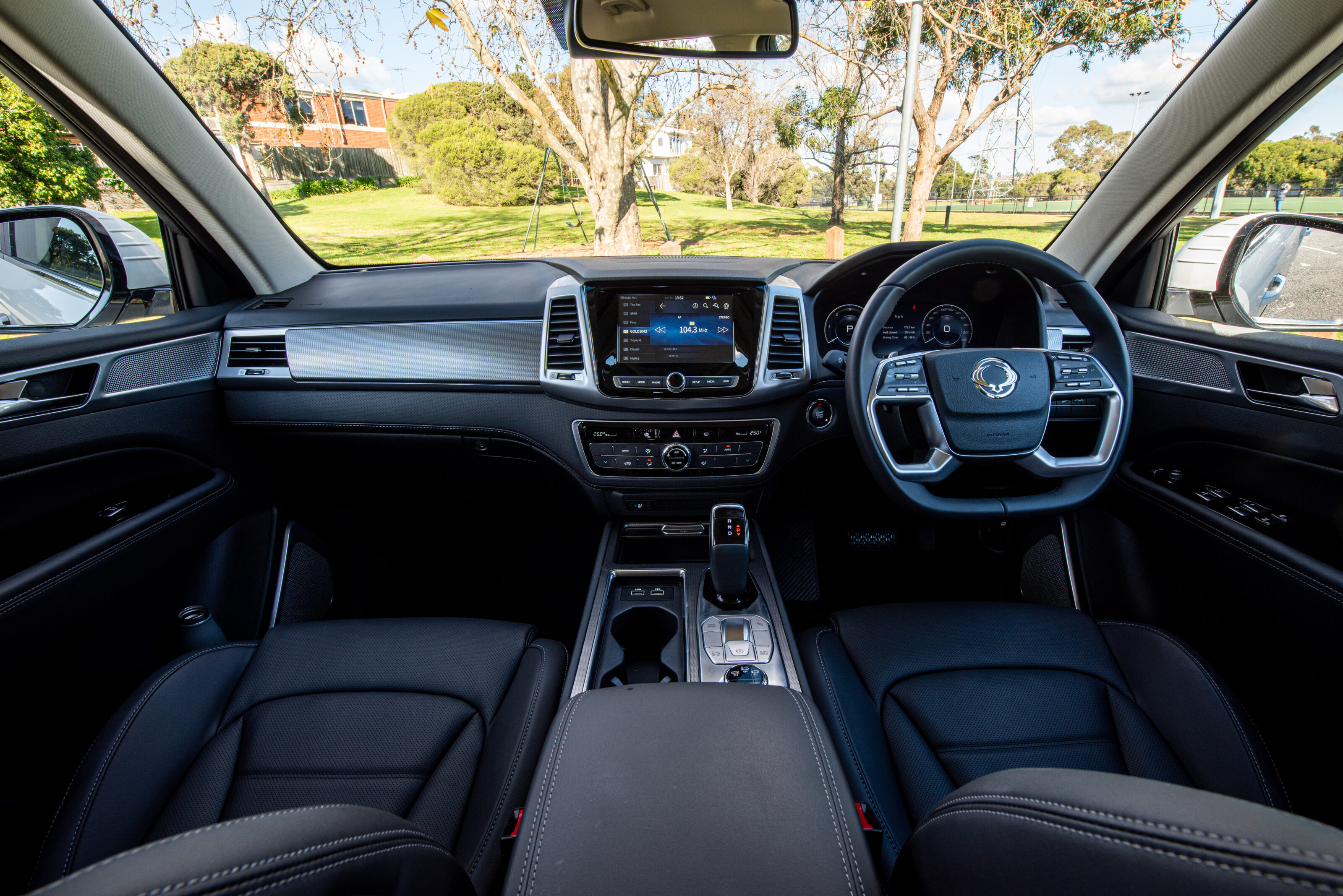
As well as seven seats, the Rexton ELX comes with 8.0-inch infotainment touchscreen and 12.3-inch digital driver display, with Apple CarPlay/Android Auto. It’s not short of creature comforts, either, which include leather-appointed seats, power-adjustable front seats with heating and ventilation, heated outboard rear seats and dual-zone climate control.
By comparison, spending more on the Ultimate brings all that plus fancier Nappa leather upholstery, illuminated scuff plates, sunroof, driver’s seat position memory, ambient interior lighting, 360-degree reversing camera, powered tailgate, touch-sensing front door locks, and a wireless phone charging pad.
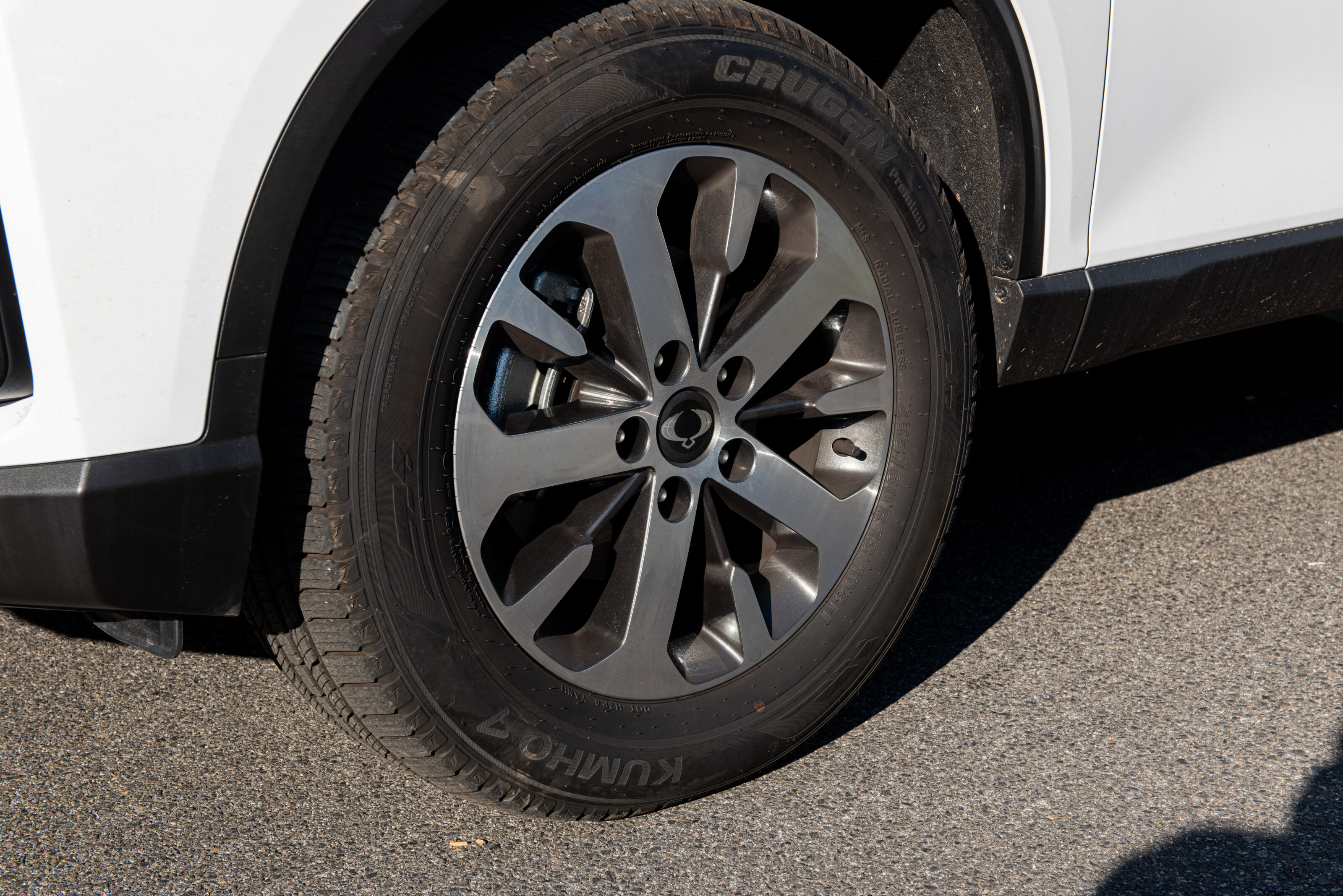
The ELX and Ultimate models are both fitted with 18-inch alloy wheels. The flagship model previously wore fancy 20-inch chrome-finished rims, which were an odd inclusion for a vehicle with genuine off-road capability.
The 18s make a lot more sense.
The Rexton is a serious off-roader, its part-time four-wheel-drive system coming with high- and low-range gearing as well as an auto-locking rear differential.
Space and Comfort
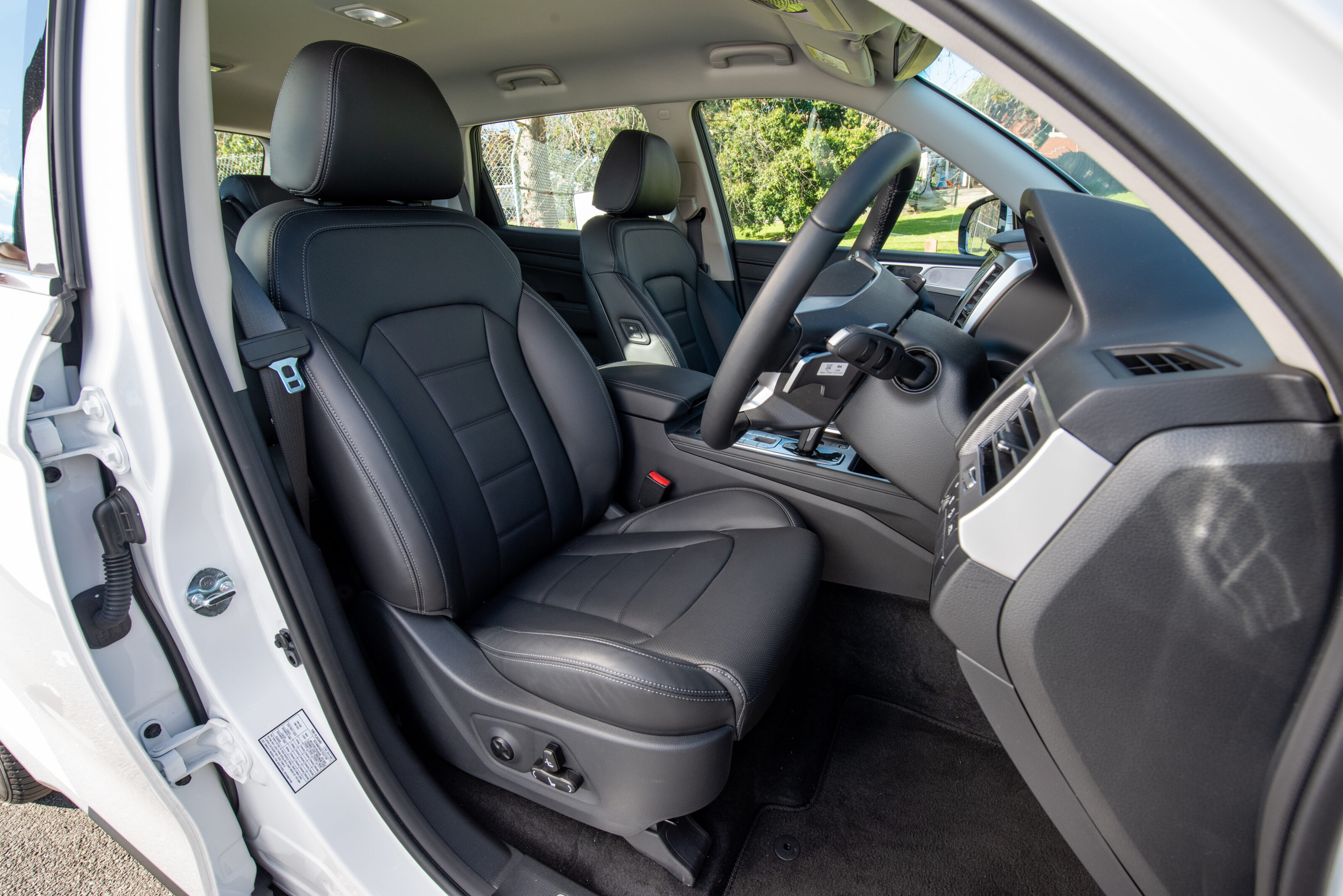
Even in ELX spec, the Rexton oozes showroom appeal. The heated and ventilated front seats are a nice place to be, with good back support and side bolstering.
Overall fit and finish are quite good. Hard plastics are mostly confined to hidden spots and the area directly above the 8.0-inch touchscreen.
The centre console looks good and features a joystick-like gear shifter and attractive transfer case control dial with knurled metal edging.
Both cup holders in the centre can be hidden by an attractive roller shutter, though you won’t be able to close it all the way if you plug your phone cable into one of the two front USB ports. There is a covered storage tray at the front and a deep tub enclosed by the padded armrest next to your hip. Other front storage areas include the glovebox and large door bins.
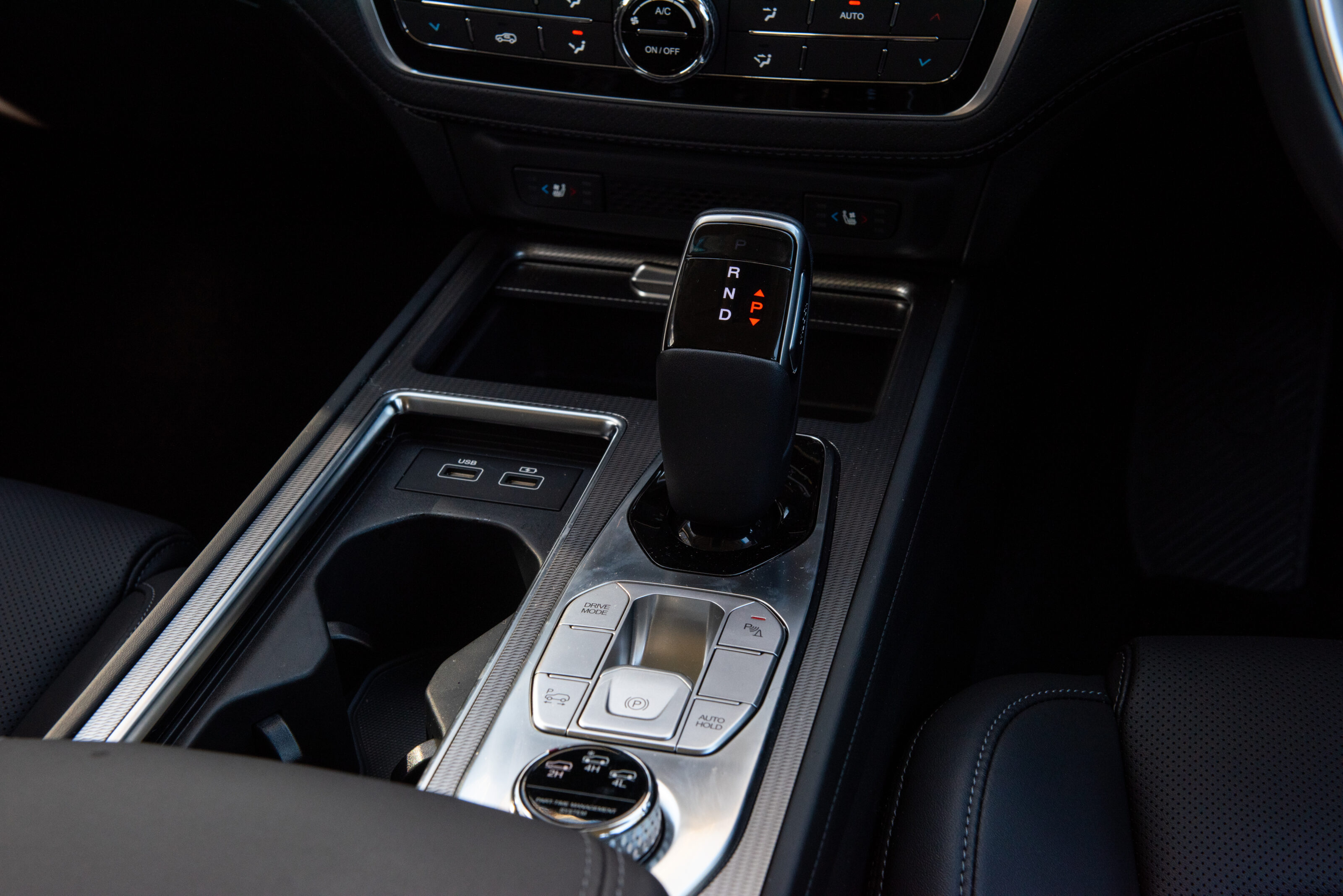
Middle-row seats are also well-padded, the outboard ones fitted with heaters. However, taller people will find leg and headroom to be a little tight, which is surprising for a large SUV like this.
The whole bench can slide back and forth, mainly to provide more third-row legroom, and the backrests recline up to about 60 degrees so passengers can catch 40 winks on longer drives.
Although the middle seat is okay for short trips, you will only be really comfortable if you have an unusually inward-curving spine. With nobody sitting there, the centre backrest folds down to become an armrest with cup holders and a handy enclosed storage tray.
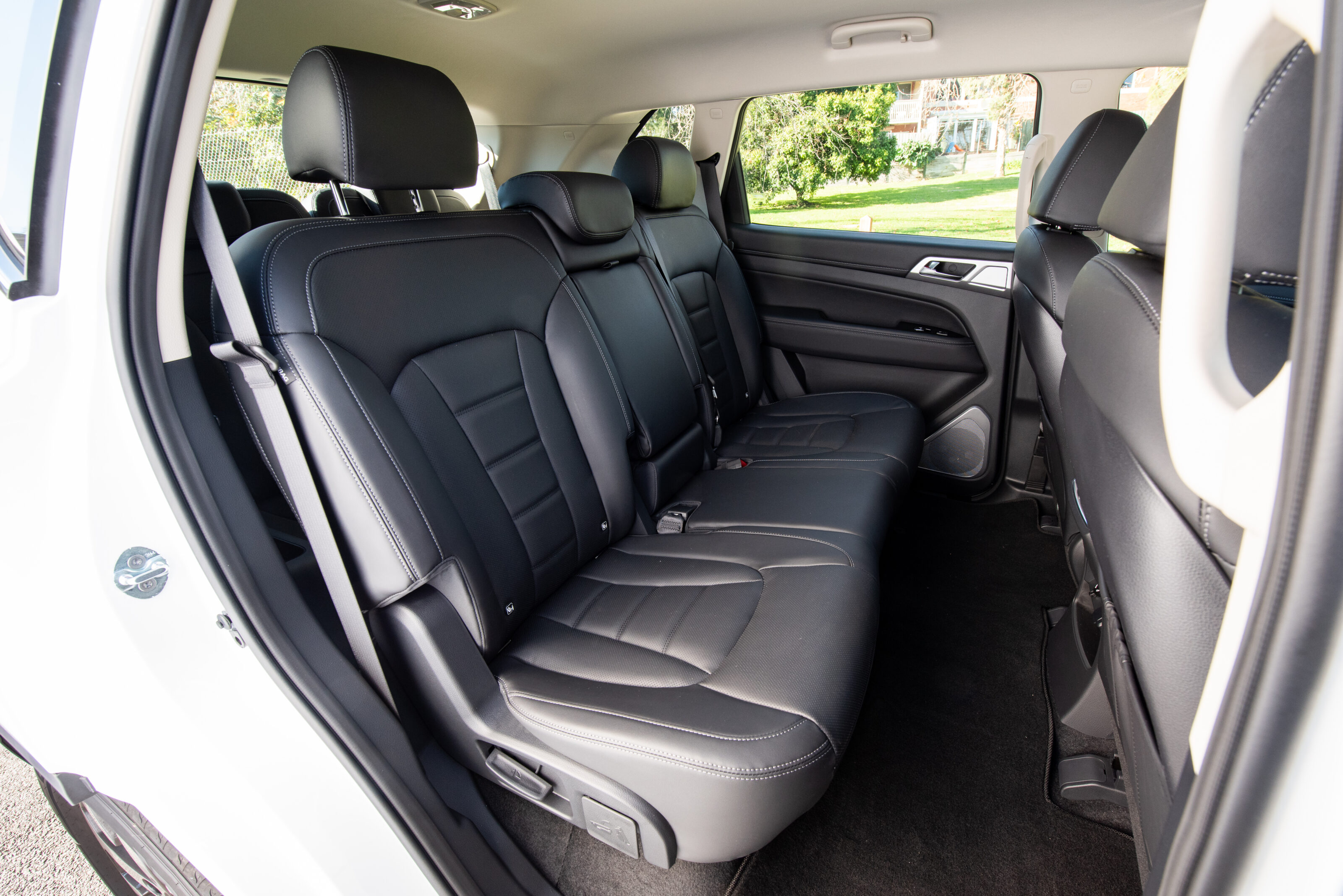
Middle-row passengers also get air vents, two USB sockets, a 12-volt socket and decent-sized door bins.
The third row is accessible by folding the middle row seatback down and rolling the lot forward. This provides a decent gap to get back there, but that is about where the convenience ends.
Unless you push the middle row forward, the rear space is very tight. The seats are very low too, so anyone from about 12 years old will be sitting with their knees up and hard against the seatbacks.
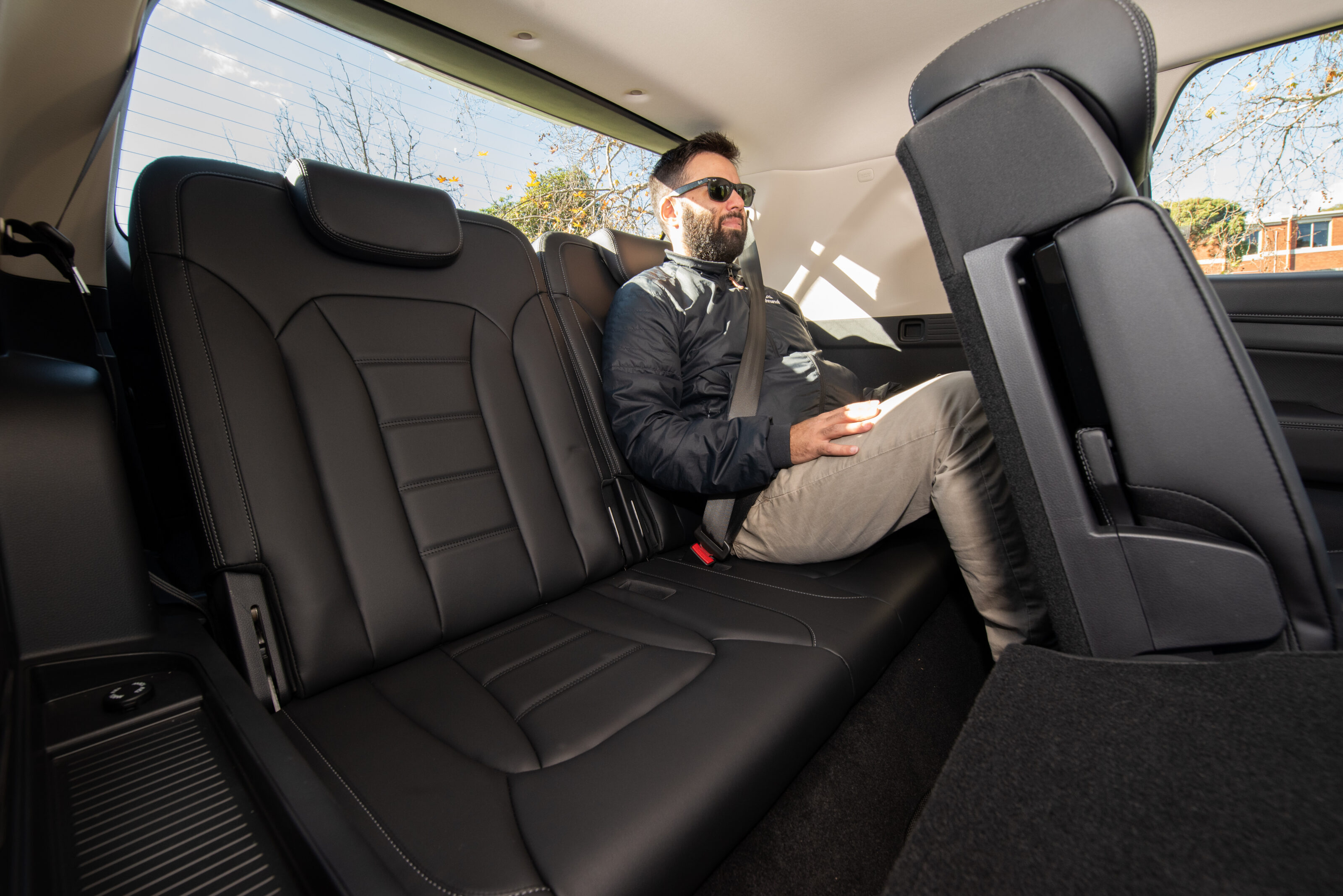
Kids will naturally find it roomier back there, but there’s no view and they’ll feel quite isolated. But at least there is an air vent with fan control back there should they feel a little queasy.
I reckon you’re best treating the Rexton as a five-plus-two SUV that brings a huge boot with pop-up seats for emergencies.
With three rows up, that boot space is very tight – the floor area is about 116cm wide with about 40cm between the powered tailgate and seatback, but that decreases as you come up because of the backrest angle. Still, it’s enough to fit your weekly shopping or a set of golf clubs.
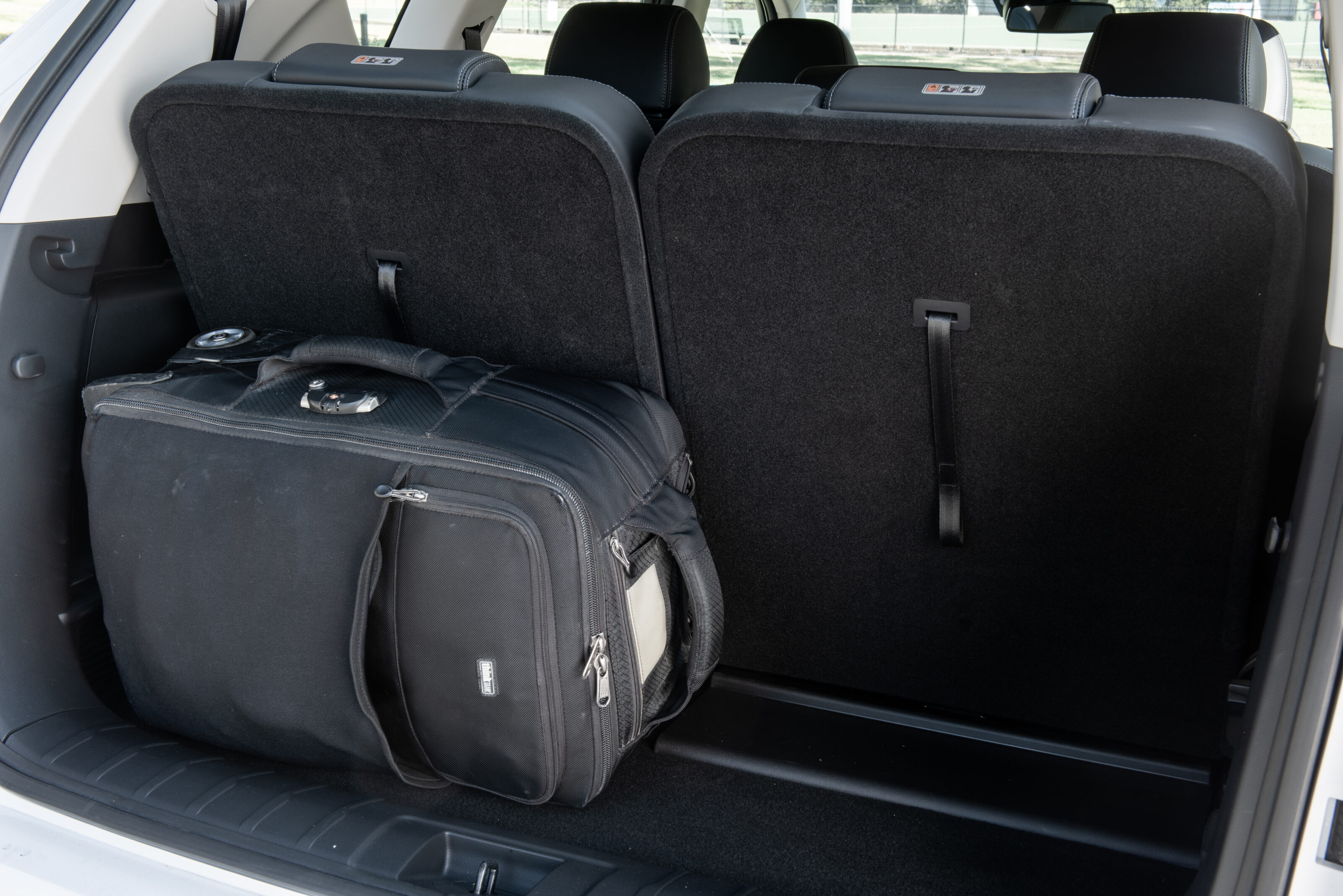
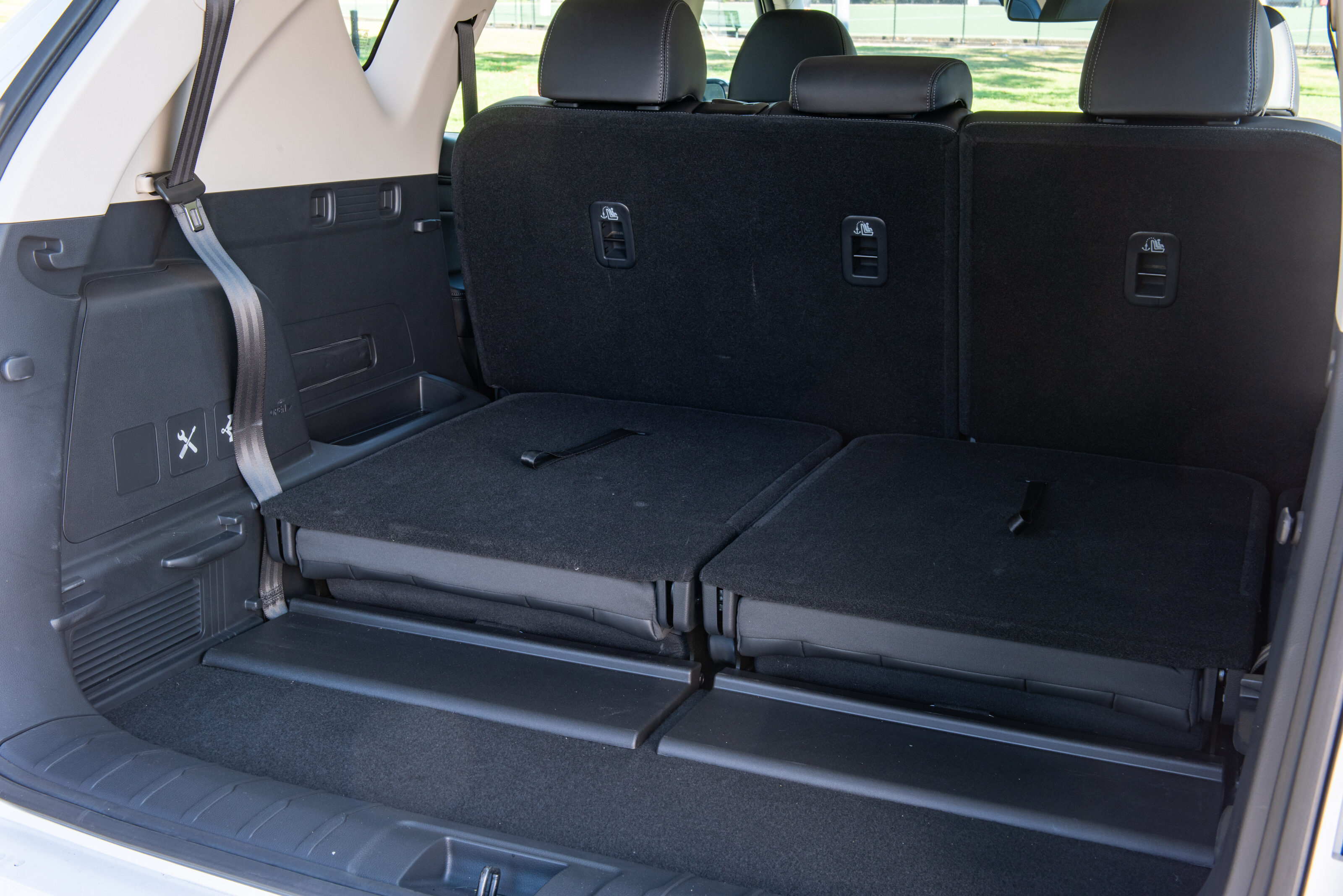
But put the second-row seats down and you have a substantial 641-litre cargo area that will take loads up to 1.2 metres long. You can also raise the floor so it lines up with the folded seats to create a flat surface.
Folding the middle row seats down or forwards brings up to 1860 litres of space and allows for loads up to 1.7 metres long.
If you need to haul more, the Rexton has a big 3500kg braked towing capacity.
On the Road
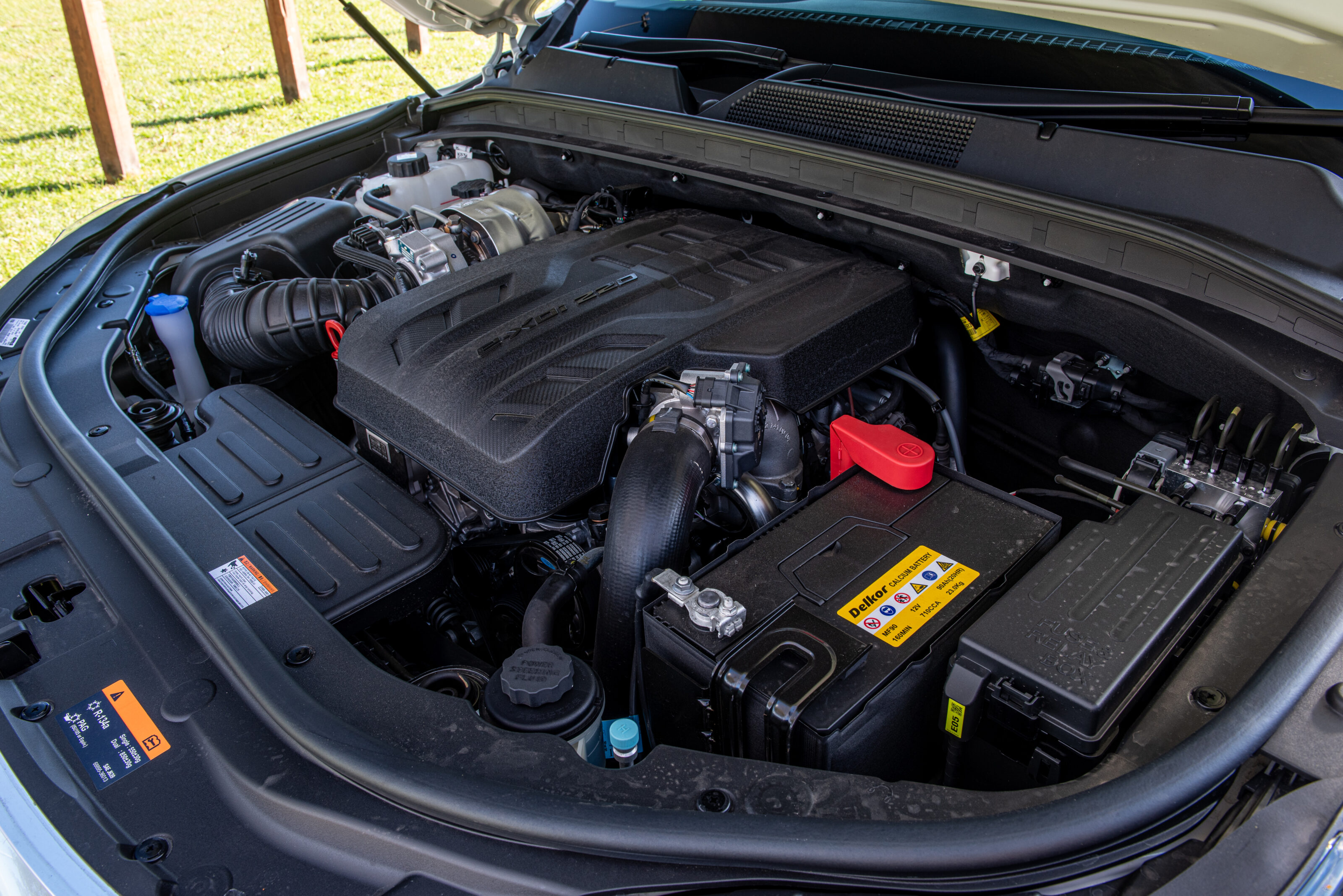
The Rexton’s 2.2-litre turbo-diesel engine produces 148kW and 441Nm delivered via an eight-speed automatic gearbox sourced from Hyundai.
It’s a smallish engine compared to its rivals, but it actually produces more power and torque than 2.4- and 3.0-litre turbo-diesels in the Pajero Sport and Isuzu MU-X.
The Rexton is primarily rear-wheel drive, but you can select high- and low-range four-wheel drive with a neat dial for when you want to go bush or to the snow.
It’s quick off the mark and will get to highway speeds soon enough, the transmission quickly finding the right gears to get you there. Once at speed, there is sufficient power in reserve for overtaking albeit with a little turbo lag.
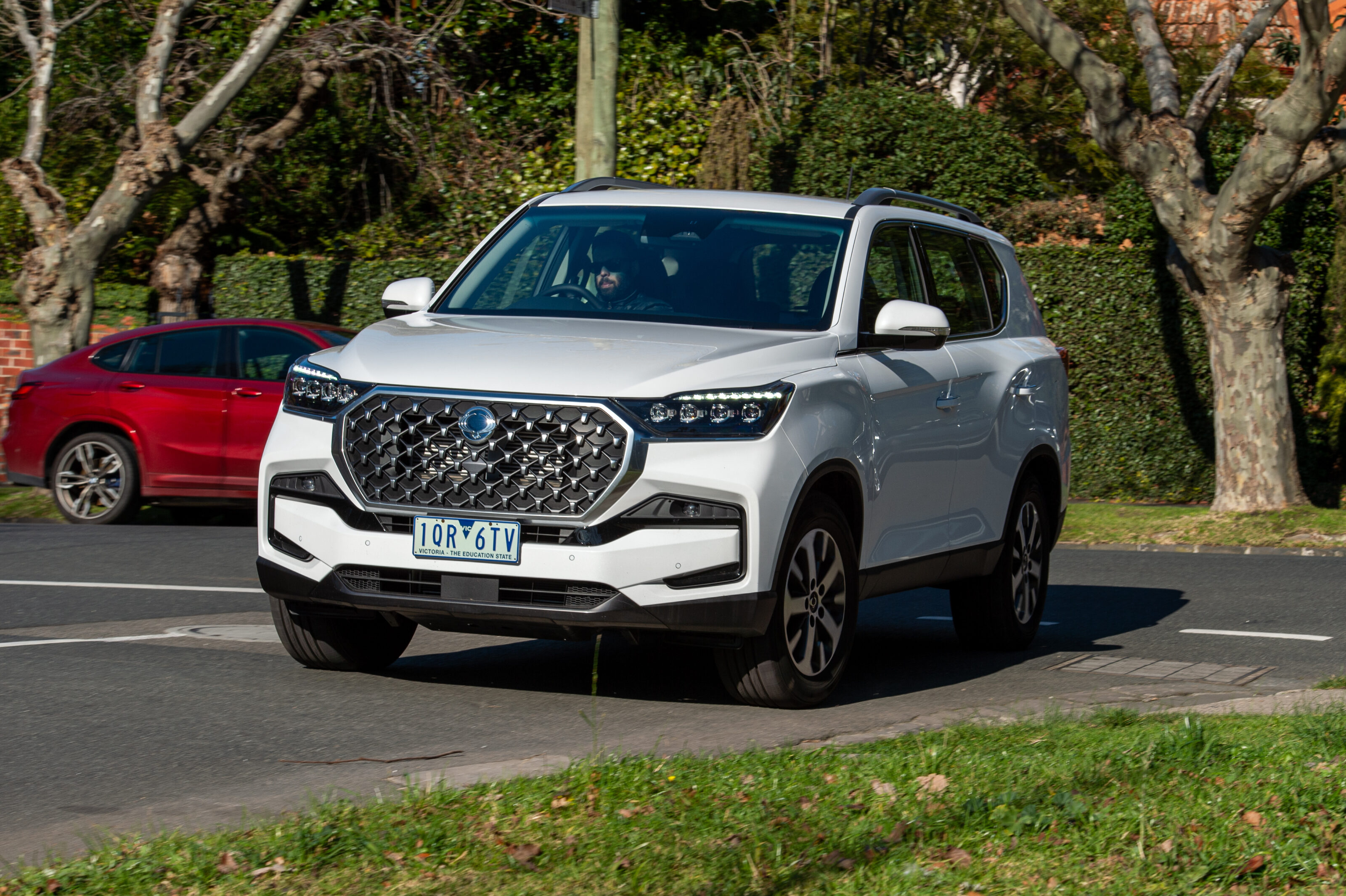
The engine sounds rather agricultural on start-up, but once you get moving is surprisingly quiet and the entire 4×4 diesel powertrain feels quite refined.
A 10-link independent rear suspension set-up with wishbones up front and coil springs at each corner brings reasonable road manners at moderate speeds around town.
However, this is an old-school body-on-frame SUV, and at higher speeds you feel every bump and crease.
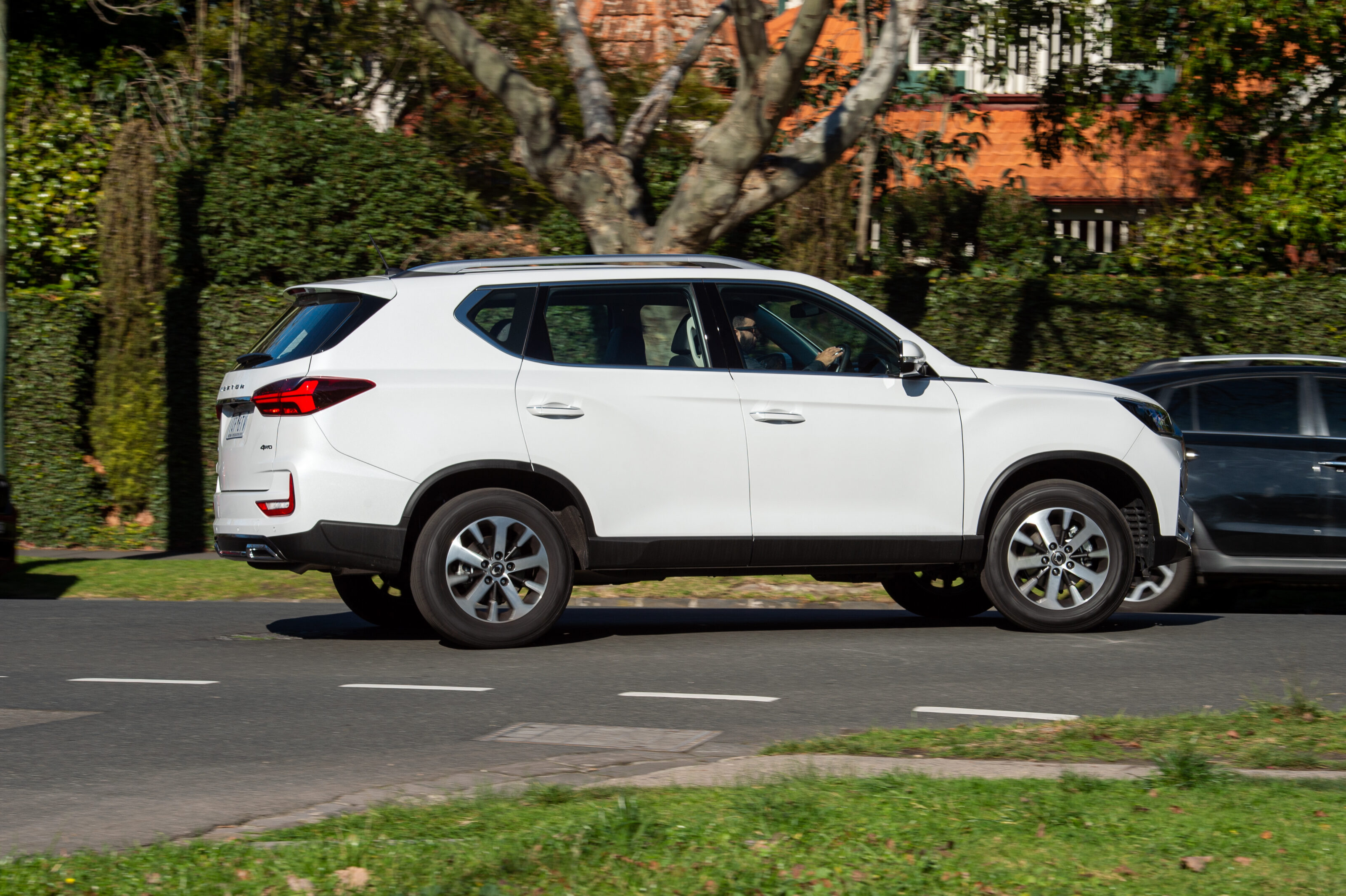
Ride quality was busy on the pre-update Rexton Ultimate with its big 20-inch rubber, but it’s noticeably tamed on the ELX’s 18s. The Rexton still bounces around a little but not quite as much.
To be fair, few of the Rexton’s direct rivals exactly provide a smooth ride – the Ford Everest being one of the notable stand-outs – but they do tend to settle a little quicker over bumps.
On the plus side, the Rexton rides well on gravel and its 203mm ground clearance will see off obstacles and speed bumps, though you’ll soon learn to negotiate them slowly.
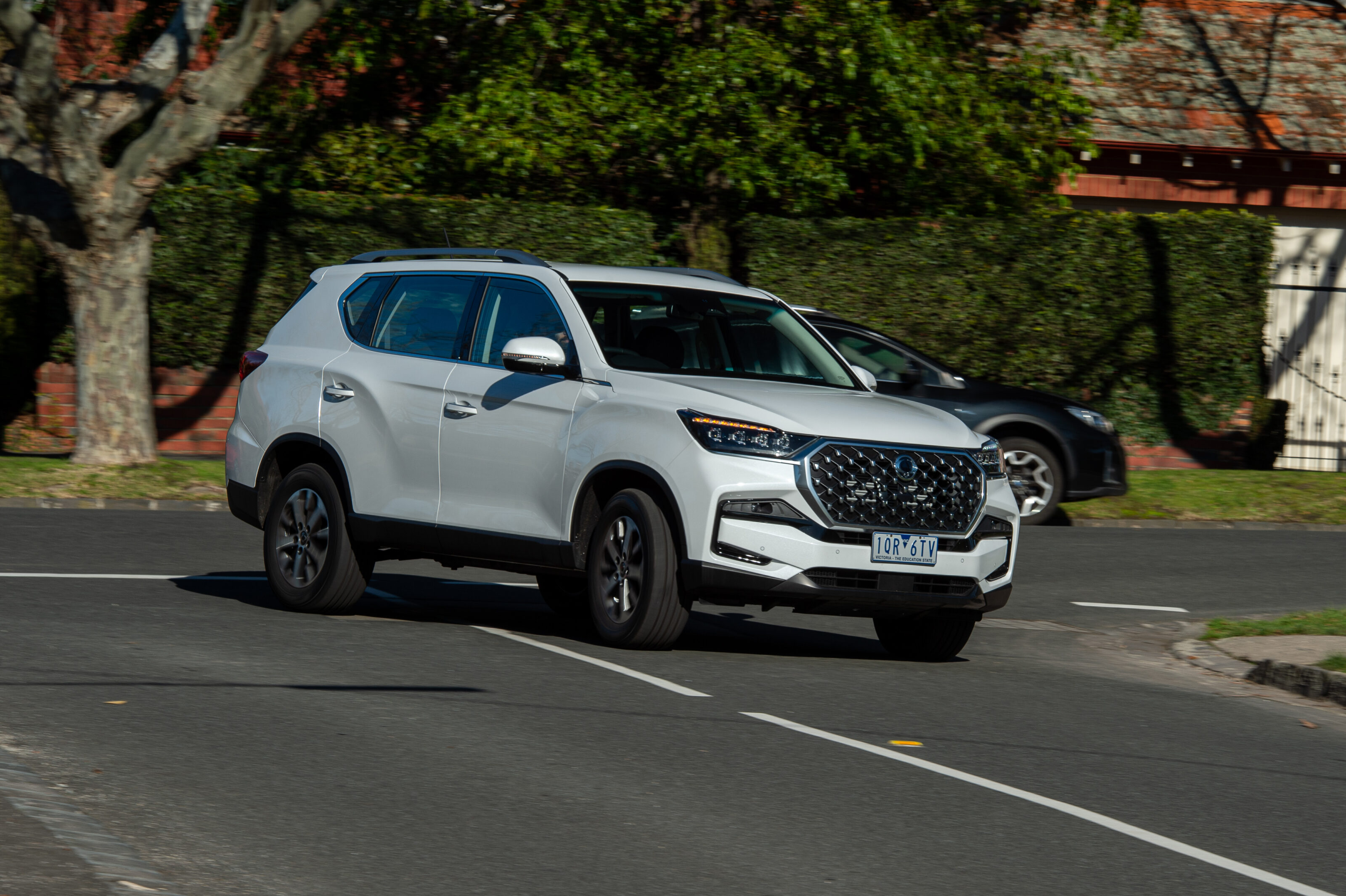
Another disadvantage of the body-on-frame chassis is that handling can be compromised, particularly on winding roads. Body roll can be quite pronounced and the steering feels a little light despite getting firmer as you speed up.
If you do overcook a bend the Rexton will do its best to avoid disaster by employing anti-rollover protection, which adjusts the amount of engine output and braking power delivered to each wheel while driving around sharp turns to keep it upright.
But it brakes okay, and down hills, you can engage paddleshifters to gear down to ease yourself into bends.
Safety
For some reason, the Rexton hasn’t been independently crash-tested by ANCAP or EuroNCAP, but both variants bring a bunch of safety features including autonomous emergency braking with forward-collision warning, braking assist, blind-spot warning, rear cross-traffic alert, lane departure warning, trailer sway control and parking sensors at both ends.
It also comes with nine airbags, including for the driver’s knee and side curtains although the third row is unprotected.
Noteworthy omissions are adaptive cruise control and lane-keep assist, which are available in the Rexton’s smaller Korando sibling.
VERDICT
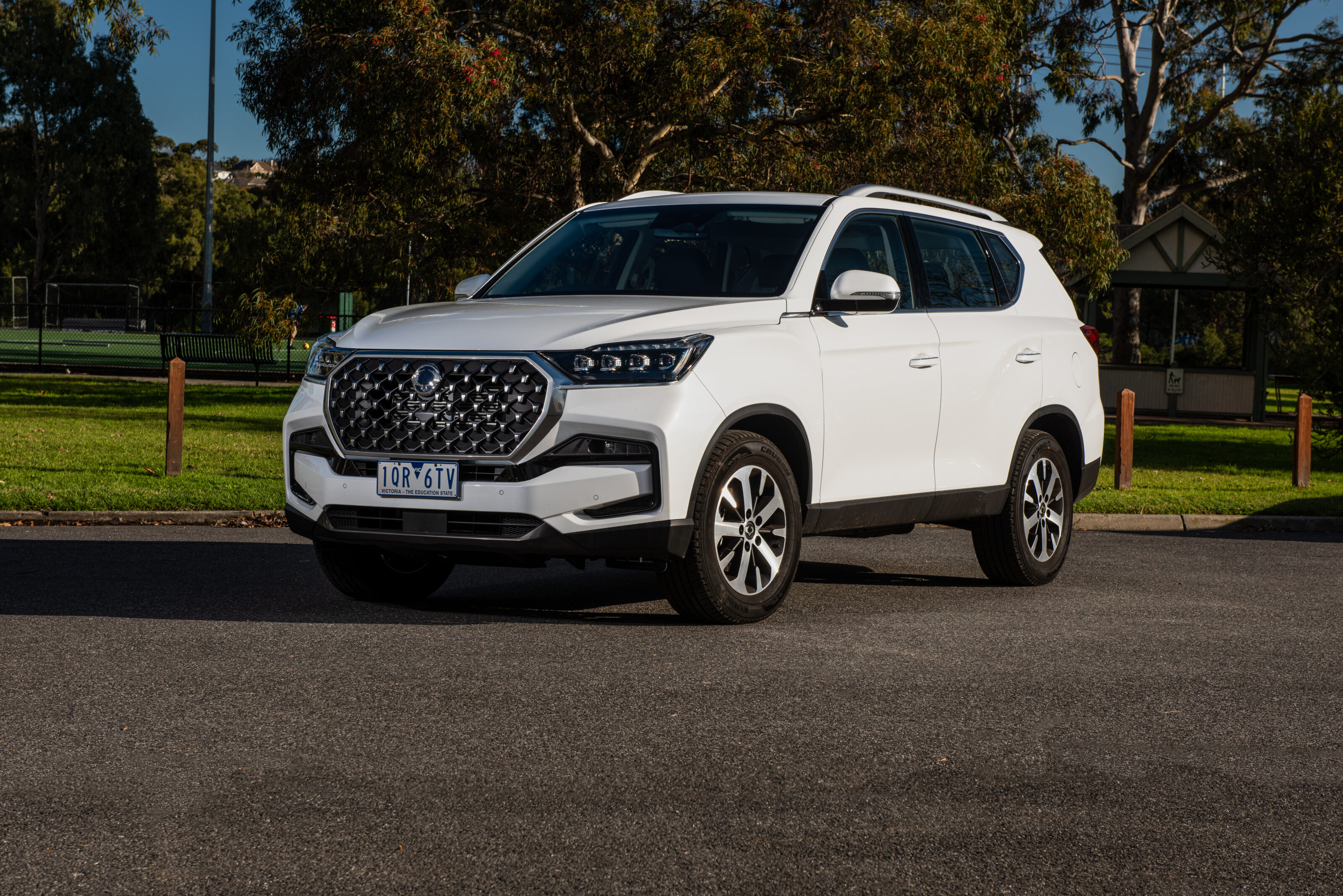
The sub-$50,000 price tag makes the SsangYong Rexton ELX quite a bargain, with its generous standard equipment list and more compliant ride making it the pick of the duo.
It represents great value for anyone seeking an affordable large SUV with a big towing capacity, huge boot, reasonable fuel economy and comfort for the daily drive while offering the opportunity to escape beyond the beaten track with a boat or caravan in tow on the weekends.
Only SUV shoppers can determine whether the Ultimate’s additional features are worth it for the extra $7000 spend.
2023 SsangYong Rexton ELX specifications
| Body | 5-door, 7-seat large SUV |
| Drive | part-time 4×4 |
| Engine | 2.2-litre turbocharged diesel 4-cylinder |
| Max power | 148kW @ 3800rpm |
| Max torque | 441Nm @ 1600-2600rpm |
| Transmission | 8-speed automatic |
| Compression ratio | 15.5:1 |
| Fuel Economy (ADR) | 8.7L/100km |
| Suspension | double wishbone (front) / multi-link (rear) |
| Weight | 2300kg |
| L/W/H | 4850/1960/1825mm |
| Wheelbase | 2865mm |
| Brakes | all-wheel discs |
| Tyres | 255/60 R18 |
| Wheels | 18-inch alloy |
| Price | $48,990 drive-away |
Score breakdown
Things we like
- Price and equipment levels
- Performance
- Cabin comfort and quiet ride
Not so much
- Ride and handling
- Claustrophobic third row
- No adaptive cruise control
We recommend
-
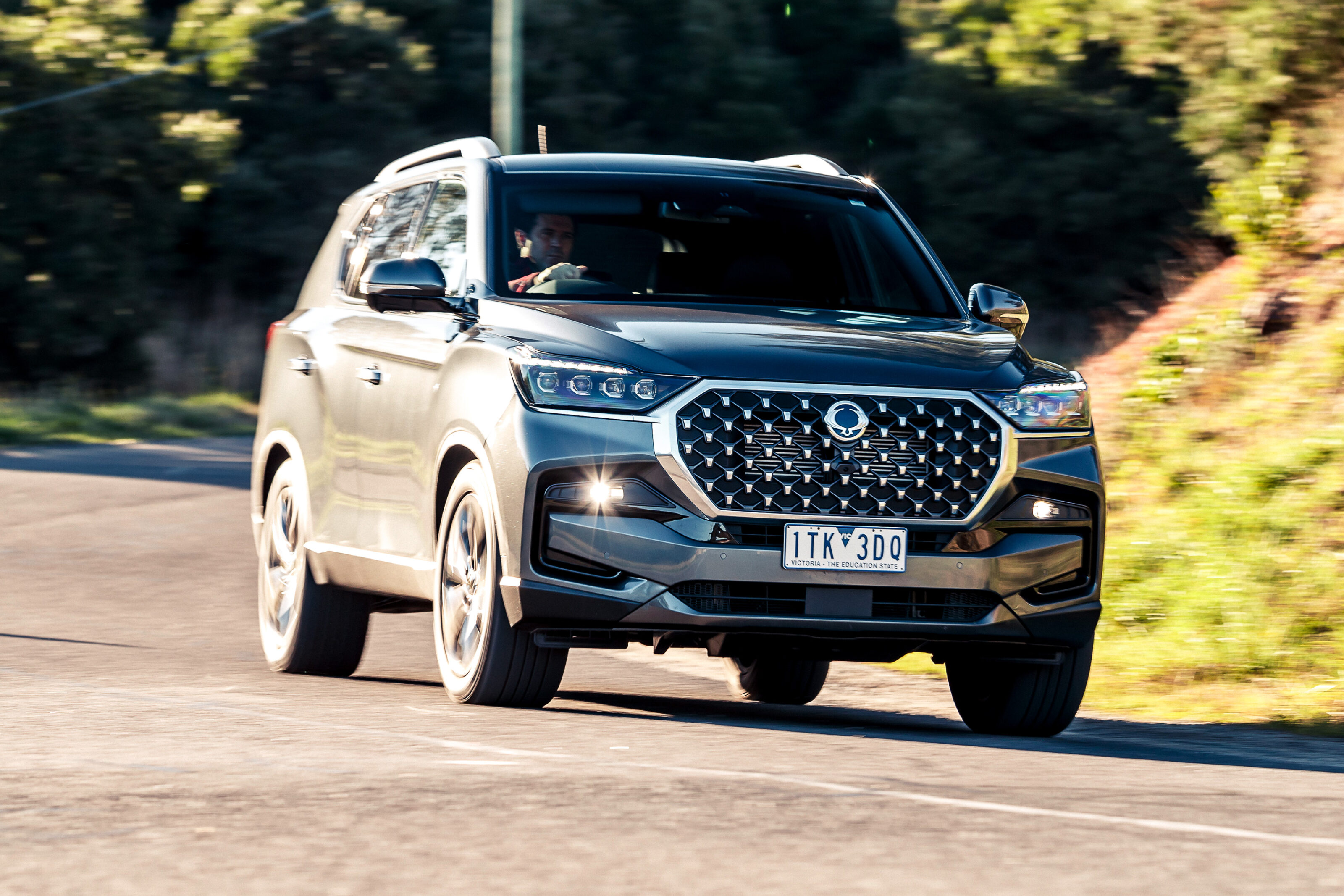 Reviews
Reviews2021 SsangYong Rexton Ultimate review
Based on the Musso ute, SsangYong’s range-topping large 4WD SUV brings a plush interior for a bargain price, but is it good value?
-
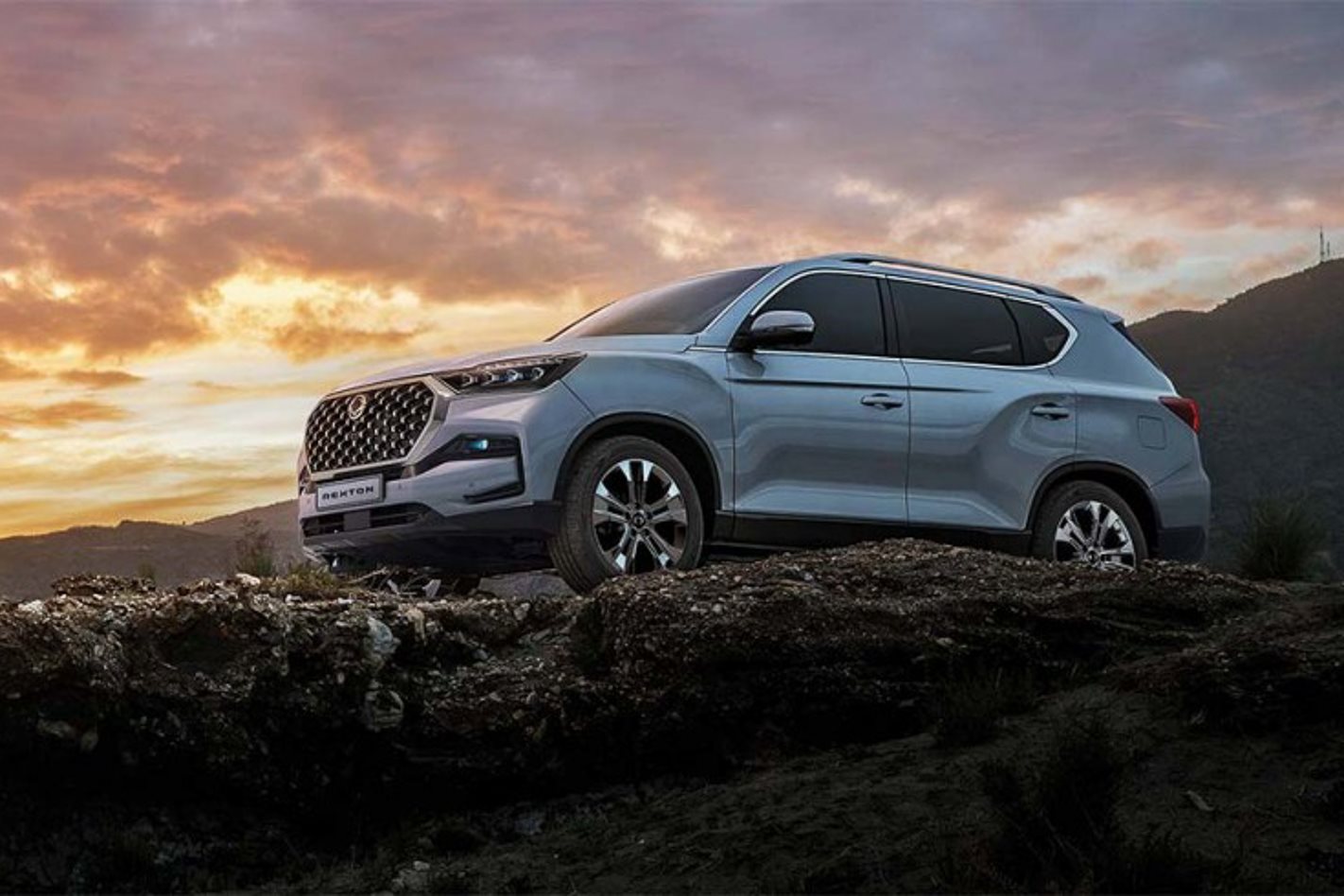 News
News2021 Ssangyong Rexton: Australian details revealed for facelifted SUV
More power, new looks and revised line-up coming to the 2021 Ssangyong Rexton seven-seat large SUV


